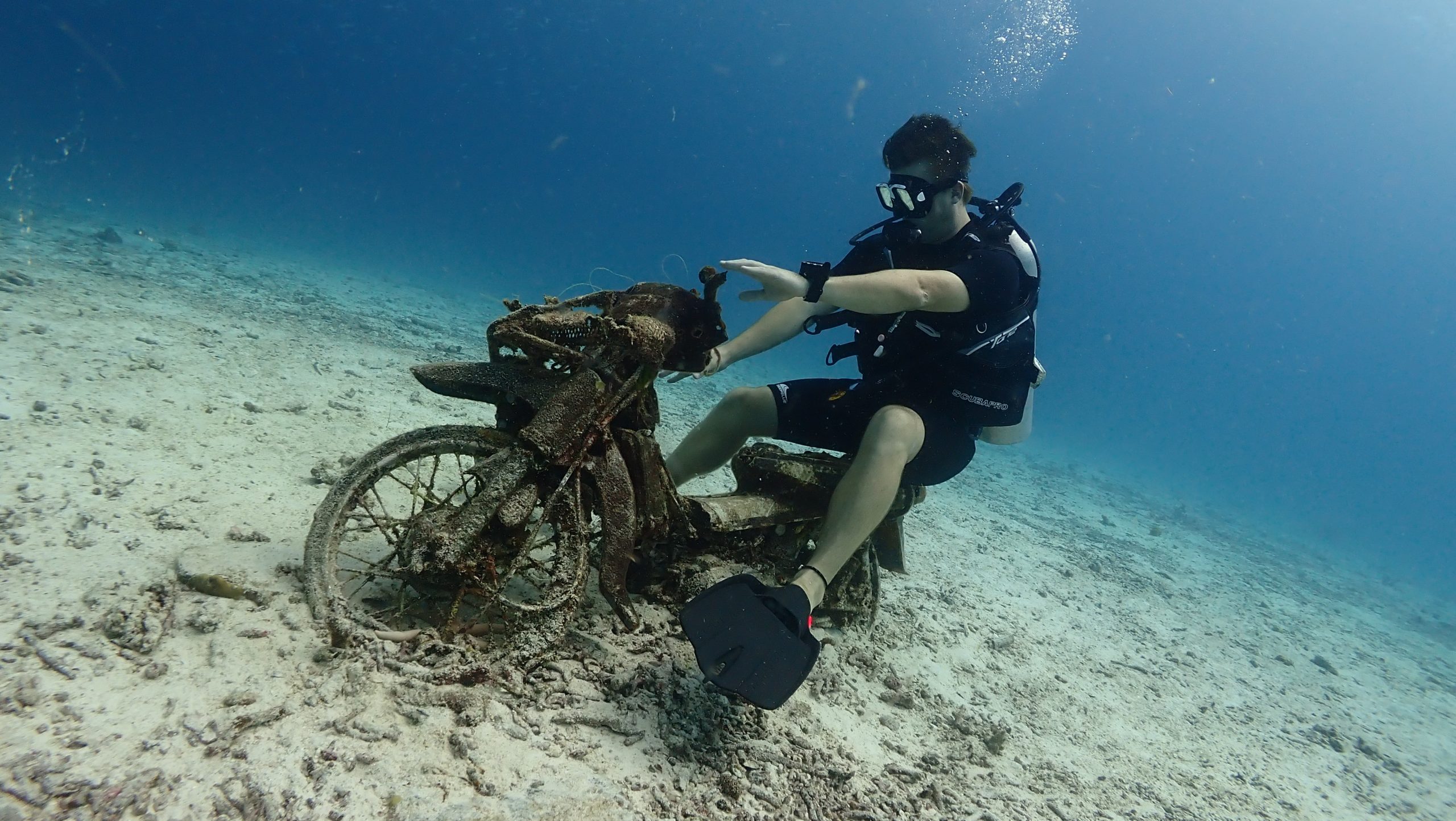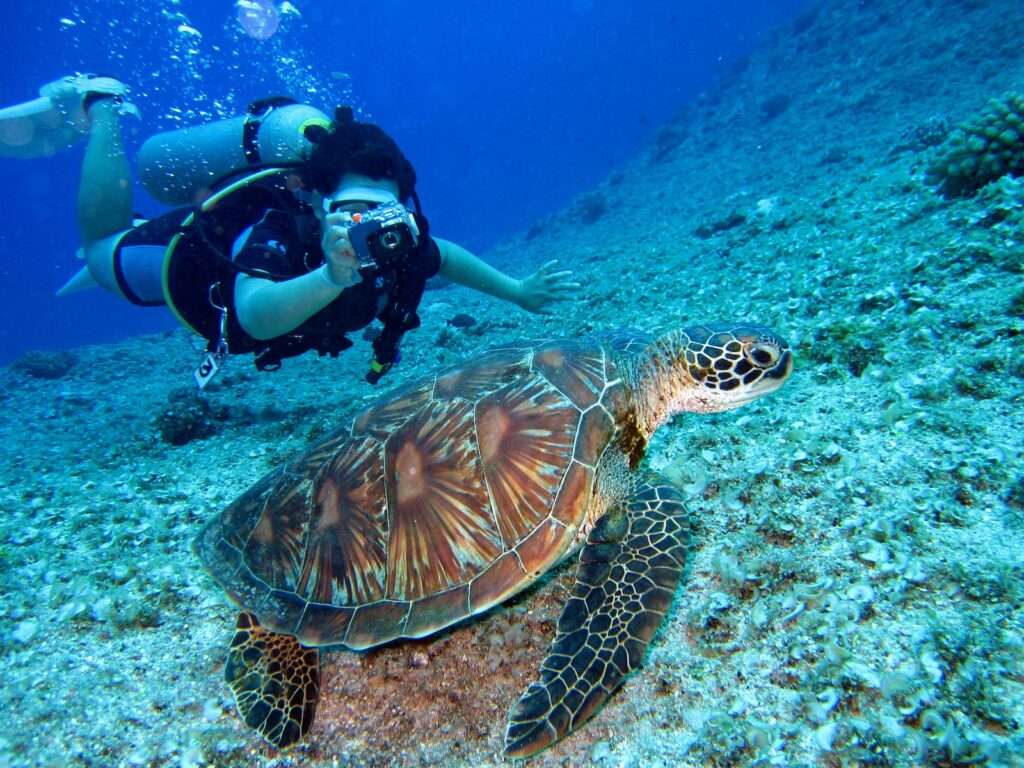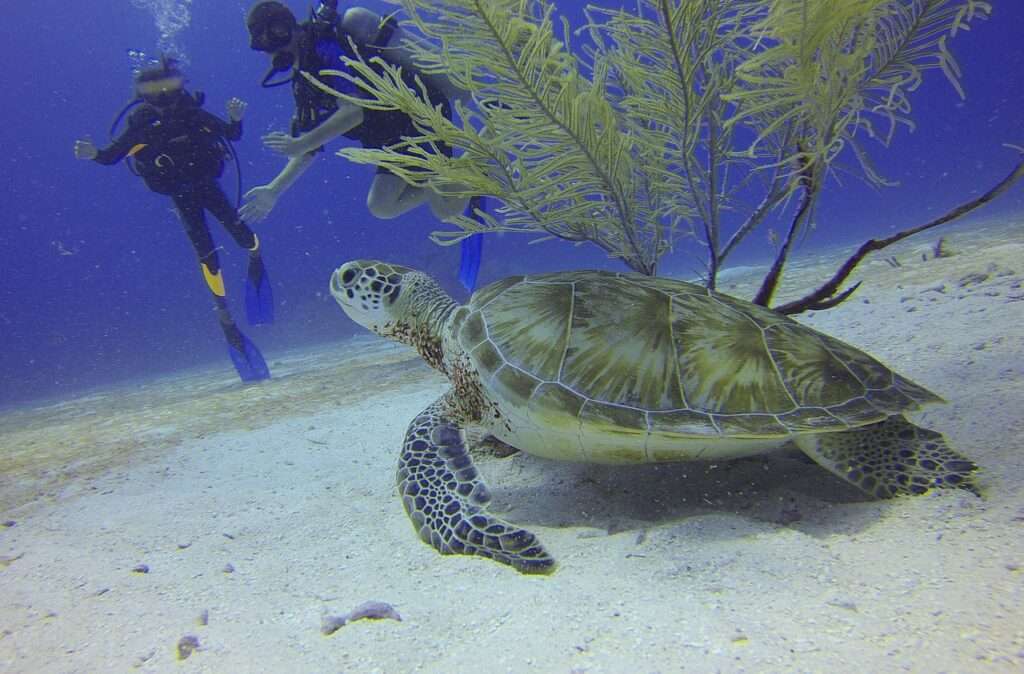The crystal clear waters of Phuket are perfect for beginning divers
Introduction: My First Time in Phuket’s Waters
I still remember the first time I put on a diving mask and breathed underwater in Phuket. My heart was racing, a mixture of fear and excitement taking over me. Would I be able to do it? What if I panicked? But when I finally submerged into the warm, crystal-clear waters, a completely new world opened up before me. Colorful fish dancing around me, corals in shapes I never imagined existed, and that unique feeling of floating as if I were flying… It was love at first sight!
Beginner’s Guide to Scuba Diving in Phuket starts exactly like this – with a little courage and lots of curiosity. If you’re thinking about trying this incredible sport during your trip to Thailand, you’re in the right place. I’ll share everything I’ve learned after hundreds of dives in this underwater paradise, and I promise: it will be an unforgettable journey!
Why Phuket Is the Best Place for Beginner Divers
Phuket isn’t just a beautiful island with breathtaking beaches and delicious food. It’s also one of the best places in the world for those starting out in diving, and that’s no exaggeration! When I started working at Dive Safe Phuket, I quickly realized why so many people choose this island for their first underwater experience:
- Warm water year-round: While in many places you need to wear thick wetsuits, here the water temperature stays between 27°C and 30°C (80-86°F). It’s like a warm bath!
- Amazing visibility: On most days, you can see up to 20-30 meters (65-100 feet) ahead of you, which means less stress for beginners.
- Many dive schools with instructors who speak multiple languages: We have professionals who can teach you in English, Spanish, Russian, Chinese, and many other languages.
- More affordable prices: Compared to places like Australia or the Caribbean, taking your diving course in Phuket can cost up to 50% less.
- Abundant marine life even in shallow waters: You don’t need to go very deep to see amazing things!
When my friends ask me where to start diving, I always say: “Come to Phuket, you won’t regret it!”
Best Time to Dive in Phuket
Did you know we can dive in Phuket all year round? It’s true! But there are important differences between seasons that can make all the difference in your experience.
High Season (November to April)
This is the period I most recommend for beginners for several reasons:
- The sea is calmer, almost like a lake on many days
- Visibility is spectacular, frequently above 20 meters (65 feet)
- Almost no rain, so boat trips are more pleasant
- You have chances to see manta rays and whale sharks (the gentle giants of the ocean)
The downside? It’s also when Phuket is most crowded with tourists and prices go up a bit.
Monsoon Season (May to October)
Many people think you can’t dive during monsoon season, but that’s a myth! We continue diving almost every day, with some differences:
- The sea can be a bit rougher on some days
- Visibility sometimes decreases to 10-15 meters (30-50 feet) (still very good!)
- There are rainy days, but usually they’re quick showers
- Prices are lower and there are fewer people at dive sites
A little secret: some of my most memorable dives happened during monsoon season, when we encountered huge schools of fish that come to feed in the more nutrient-rich waters.
Best Places for Beginners to Dive in Phuket
When you’re just starting out, where you dive makes all the difference. You want calm waters, not too deep, and with plenty to see. Here are my favorite places to take someone who’s doing their first dives:
Coral Island (Koh Hae)
This is my favorite place to take beginners! It’s only a 15-minute boat ride from Phuket and offers:
- Depth of only 5-12 meters (15-40 feet)
- Minimal or non-existent currents
- Colorful corals full of clownfish (yes, like Nemo!)
- Water so clear it feels like you’re floating in air
My tip: on the east side of the island there’s an area called “Angelfish Garden” where dozens of these beautiful fish swim around you without fear.
Racha Yai Island
A bit further (about 45 minutes by boat), but worth every minute:
- Has a U-shaped bay that protects divers from the wind
- White, soft sand at the bottom (great for practicing your knees-down skills)
- Sea turtles are frequent visitors
- Perfect for your first real reef dive
A personal story: this is where I saw my first sea turtle, an experience that moved me to tears (yes, you can cry inside a diving mask!).
Kata Bay
For days when the sea is a bit rougher, we have this sheltered spot:
- Dive directly from the beach (no boat needed)
- Artificial reef full of marine life
- Ideal for diving courses and skills practice
- Excellent low-cost option for beginners
This was the place where I did my own instructor training, so it has a special place in my heart.
How to Get Your Diving Certification in Phuket
There are a few options for those who want to learn to dive, depending on how much time you have and how serious you want to take the sport:
Discover Scuba Diving Experience
This is perfect if you only have one free day and want to try it out:
- Duration: half a day to one day
- Includes: basic training in shallow water and one real dive
- Maximum depth: 12 meters (40 feet)
- Average price: 3,500-4,000 baht (about $100-115)
- Not a certification, but an introductory experience
Many of our clients start like this and end up so in love with diving that they come back to take the full course!
Open Water Diver (OWD) Course
This is the basic certification that allows you to dive almost anywhere in the world:
- Duration: 3-4 days
- Includes: theory, pool training, and 4 ocean dives
- Maximum depth after certification: 18 meters (60 feet)
- Average price: 12,000-15,000 baht (about $340-430)
- Your card is valid for life
I recommend reserving this time in your travel itinerary – it’s well worth it! With this certification, you can dive practically anywhere in the world.
Advanced Open Water (AOW) Course
If you already have the basics and want to go deeper (literally):
- Duration: 2-3 days
- Includes: 5 specialty dives (including deep diving and navigation)
- Maximum depth after certification: 30 meters (100 feet)
- Average price: 10,000-13,000 baht (about $285-370)
My honest opinion? If you have time, doing the basic and advanced courses together in Phuket is an excellent idea, as prices are better than in many other countries.
Choosing the Right Dive School in Phuket
This is perhaps the most important step to ensure an amazing and safe experience. When choosing where to learn to dive, pay attention to:
Certification and Reputation
- Look for schools affiliated with PADI, SSI, or NAUI (the largest certifying agencies)
- Read reviews on TripAdvisor or Google
- Ask how long they’ve been operating
At Dive Safe Phuket, for example, we’ve been working on the island for over 15 years and maintain a 5-star rating on review platforms.
Group Size
A super important point! Some schools put up to 8 students per instructor, which is not ideal for beginners. Look for:
- Maximum of 4 students per instructor
- Or even better, private or buddy classes
The smaller the group, the more attention you receive and the safer you feel.
Language and Communication
Diving involves learning important safety procedures, so:
- Check if the school offers instructors who speak your language
- Course materials in your native language also help a lot
Equipment and Boats
- Equipment should be new or well-maintained
- Spacious boats with bathrooms and covered areas are much more comfortable
- Some schools offer free photos/videos as a bonus
What to Bring on Your Diving Day
When you’re going diving for the first time, it’s normal to wonder what to bring. Here’s my essential list, based on thousands of dives with beginners:
Must-Have Items:
- Comfortable swimwear (avoid tiny bikinis or ones that might come off easily)
- Biodegradable sunscreen (regular sunscreen kills corals!)
- Towel
- Sunglasses and hat for breaks on the boat
- A light jacket or long-sleeve shirt (it can get cold after diving)
- Motion sickness medication if you’re sensitive
- Money for tips and extras
- Your passport or a copy (needed to register you as a diver)
What NOT to Bring:
- Diving equipment (the school provides everything)
- Underwater camera for your first dives (you’ll already have plenty to focus on)
- Jewelry or valuables (they can easily get lost)
- Too many clothes (you’ll be in diving gear most of the time)
A personal tip: bring a reusable water bottle! Diving makes you very thirsty and this way you avoid using disposable plastic.
Safety Tips I’ve Learned in Years of Diving
After guiding hundreds of beginner divers, I’ve learned that safety comes first. Here are my most important tips:
Before Diving:
- Be 100% honest about your health and physical condition
- Rest well the night before (no partying late!)
- Hydrate a lot the day before and before diving
- Don’t fly within 24 hours after diving (seriously, this is dangerous!)
- Listen carefully to the safety briefing, even if it seems boring
During the Dive:
- Breathe normally and never hold your breath (rule #1 of diving)
- If you feel any discomfort, signal to your instructor immediately
- Stay close to your buddy or instructor
- Move slowly – it’s not a race!
- Never touch anything (for your safety and the marine environment)
One thing I always tell my students: “In diving, there are no heroes. There are old divers and bold divers, but few old AND bold divers.”
What to Expect from Your First Dive: Sensations and Emotions
Nobody told me what the sensation of the first dive would be like, so I want to prepare you for what might happen:
Normal Physical Sensations:
- Pressure in your ears (you’ll learn to equalize)
- A slight resistance when breathing through the regulator
- Feeling like you’re floating in zero gravity
- Your voice will sound different when talking underwater
- You might hear the sound of your own breathing (like Darth Vader!)
Common Emotions:
- An initial moment of panic or nervousness (happens to almost everyone)
- Wonder when you see the underwater world for the first time
- An unexplainable feeling of peace and calm after you get used to it
- Euphoria when you realize you’re actually breathing underwater
- A smile that doesn’t leave your face for hours after the dive
My favorite moment as an instructor is seeing that exact instant when a student’s initial nervousness transforms into pure joy. It’s like watching someone discover a superpower they didn’t know they had!
Marine Life You Might Encounter in Phuket
One of the greatest joys of diving is meeting the ocean’s inhabitants. In Phuket, even first-time divers have the chance to see:
Common Encounters (Almost Guaranteed):
- Clownfish playing in anemones
- Huge schools of colorful fish
- Moray eels peeking from their hideouts
- Crabs and shrimp hidden among the corals
- Octopuses changing color (if you have attentive eyes!)
Special Encounters (With a Bit of Luck):
- Sea turtles (quite common at Racha Yai)
- Black-tip reef sharks (completely harmless to humans)
- Tiny seahorses
- Rays hidden in the sand
- Pufferfish inflating when scared
A personal story: on one of my first dives in Phuket, a sea turtle swam up to me, looked into my eyes for a few seconds, and calmly went on its way. It was as if it was saying “Welcome to my world.” That moment changed my life and made me decide to live here permanently.
Beyond Diving: Making the Most of Your Trip to Phuket
Although I could talk about diving all day, Phuket has so much more to offer! Between your days of underwater adventures, don’t miss:
Must-See Beaches:
- Kata Beach: ideal for families and beginner surfers
- Freedom Beach: a hidden paradise accessible only by boat
- Nai Harn Beach: a local favorite, less touristy
- Surin Beach: more exclusive, with elegant beach clubs
Delicious Foods to Try:
- Street Pad Thai (costs less than $6 and is better than in restaurants!)
- Tom Yum Goong (spicy shrimp soup that warms the soul)
- Mango sticky rice (addictive sweet rice dessert with mango)
- Fresh seafood at beachside restaurants
Cultural Experiences:
- Big Buddha (huge statue with panoramic view of the island)
- Wat Chalong Temple (Phuket’s main Buddhist temple)
- Old Phuket Town (beautiful Sino-Portuguese architecture)
- Weekend Night Market (local food, art, and music)
My golden tip: reserve at least one day to rent a motorbike or car and explore the less touristy side of the island. The landscapes in central Phuket are breathtaking!
Frequently Asked Questions About Diving for Beginners in Phuket
Over the years working at Dive Safe Phuket, these are the questions I hear most:
“Do I Need to Know How to Swim Well to Dive?”
You need to feel comfortable in the water and know basic swimming, but you don’t need to be an Olympic athlete! The diving equipment keeps you floating.
“What If I Panic Underwater?”
Instructors are trained to handle this! You always practice in shallow water first, and only go deeper when you’re comfortable. Besides, you’re never alone – your instructor stays by your side the whole time.
“Does Diving Hurt Your Ears?”
It can cause pressure if you don’t equalize (a simple technique we teach). It’s like when a plane takes off, but you learn to easily relieve it.
“Will I See Sharks? Are They Dangerous?”
In Phuket, we might see small reef sharks, but they’re shy and completely harmless to humans. In fact, most divers are sad when they DON’T see sharks!
“How Many Days Should I Reserve for the Diving Course?”
Ideally, reserve 4 days for the basic course. This allows a comfortable pace without rushing.
“Can I Dive If I Wear Glasses?”
Absolutely! Masks can have prescription lenses, or you can wear contact lenses under the normal mask.
My Personal Journey as a Diver in Phuket
When I first arrived in Phuket, I was just a curious tourist who could barely swim properly. I never imagined that first trial dive would change the course of my life.
From nervous student to passionate instructor, my journey has taught me that the ocean has profound lessons to offer us: patience, respect for nature, the beauty of moments of silence and contemplation.
Today, after thousands of dives in these waters, I still feel that same excitement from the first day every time I put my head underwater. And my greatest joy is sharing this experience with people who, like you, are taking their first steps in this adventure.
Conclusion: Your First Dive Is Just the Beginning
If you’ve read this far, you’re probably seriously considering trying diving in Phuket. And I can say with certainty: this might be one of the best decisions of your life.
The underwater world has a unique magic that few people have the privilege to know. It’s a place where time seems to slow down, where problems and worries from the surface are temporarily suspended, and where you can feel a deep connection with nature.
More than a vacation activity, diving can become a lifelong passion, opening doors to adventures all over the world. Many of my students started with a simple trial dive in Phuket and today have dived at the most spectacular reefs on the planet.
And even if you only dive once in your life, I guarantee it will be a memory you’ll carry forever.
So, what are you waiting for? The warm, crystal-clear waters of Phuket are calling. Come discover a completely new world – a world where you can fly without wings, where you can feel truly free.
See you underwater!
Key Points to Remember:
- Phuket is ideal for beginners due to warm waters, excellent visibility, and qualified instructors
- The best time for diving is November to April, but it’s possible to dive year-round
- The basic course (Open Water) takes 3-4 days and certifies you to dive worldwide
- Choose schools with small groups and instructors who speak your language
- It’s not necessary to be an excellent swimmer, just to feel comfortable in water
- The experience is safe when done with qualified professionals
- Diving can become a lifelong passion







